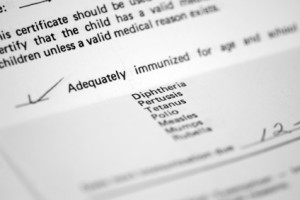How to Track Down Your Childhood Immunization Records

Those applying for a healthcare IT job might be surprised to discover that for a hospital to hire you, you must provide a copy of your childhood immunization records. True, some healthcare IT jobs won’t be bedside, but hospitals must maintain a sterile environment and avoid outbreaks against the major childhood diseases.
Unfortunately, there is no central bank of immunization records. Your records will either be with your parents, who were provided with a copy to enroll you in school, or at the doctor’s office or clinic where you received the vaccination, according to The Center for Disease Control (CDC). The schools you attended likely threw out the documents a year or two after you left each school, so unless your parents keep meticulous files of your childhood, you will have to find another way to secure your immunization records after you send your resume. Here are your options for tracking them down:
Call the doctor’s office where you received the vaccinations. Ask your parents where you received your childhood immunizations, and make sure you find out all the places you may have had them. Since many children see multiple healthcare providers over the years, you may have had the vaccines over several different locations. Keep in mind that most doctor’s offices only store immunization records for a few years after you stop going there, so they may not be there.
Look through childhood keepsakes. Sometimes, parents stash immunization records in baby books, family files or even a box of your childhood mementos in the attic. Your parents may not remember putting them there, so it’s up to you to go through these items. Don’t forget to check in your own collection of childhood keepsakes, just in case.
Access the grantee immunization websites. Visit the CDC’s interactive map of immunization websites, arranged by state, city and island, to find your state or local immunization or public health site. Each site may have additional information on how to locate your childhood immunization records. For example, the Georgia Department of Public Health site offers links and email addresses for the Georgia Registry of Immunization Transactions and Services, which has an incomplete – but possibly helpful – list of immunization transactions over several years.
Contact the college you attended. If you’re a recent graduate, your college health department may still have some of your records, including your immunization record.
Make an appointment to have an antibody (serum) titer. An antibody titer is a laboratory test where your blood is drawn and measured for antibodies (immunity) for a number of diseases. If antibody numbers are high for specific diseases, you have likely had a vaccination for that disease. The official laboratory printouts containing the numerical values for all childhood diseases outlined in the CDC’s recommended childhood immunizations will suffice for an employer instead of a childhood immunization record. However, if any of your antibodies for those diseases were too low, you will need to get those immunizations – and provide a record of them – before you accept the job.
If you are employed through Healthcare IT Leaders, a staff member will help arrange an appointment with an immunity titer for you.